Did you know that Chamomile tea is famous for its calming effect? That's right, it plays a big role in natural relaxation methods. These soothing powers come from the gentle brew of this small flower. It's been a real comfort for people dealing with anxiety, which is much more than just stress or worry. I'm talking about a tough condition that can make everyday tasks hard because of non-stop, intense worry about normal stuff.
The natural things found in this flower are known to calm the nerves. Think of it like a friendly guide leading you through an area packed full of stress-causing hormones. Now, - Chamomile, a wild-born plant, has been the go-to symbol for peace. It naturally helps those looking for comfort.
This might make you wonder - could this age-old remedy compete with modern science?
Let's think about this: Chamomile tea's natural approach to handling anxiety is noteworthy. While it's not a replacement for professional medical help, brewing a cup of Chamomile tea is like a trustworthy friend in calm moments.
Are we ready to keep the discussion going?
What Is Chamomile?
Do you know about the chamomile used in teas and many health products? These tiny flowers, known as Matricaria chamomilla, are part of the Asteraceae family, and they do more than just look beautiful. They became important over the centuries because they make people healthier.
You may be surprised to hear that chamomile comes in two different kinds: German chamomile and Roman chamomile. Even though each kind brings its own health benefits, both types help improve your health in general. That's a pretty cool fact to know.
Here's another interesting snippet - chamomile is packed with flavonoids. These mighty plant chemicals spread all over our bodies and could give us lots of health benefits. When people talk about antioxidant-loaded "superfoods," chamomile often gets a mention due to its high flavonoid content.
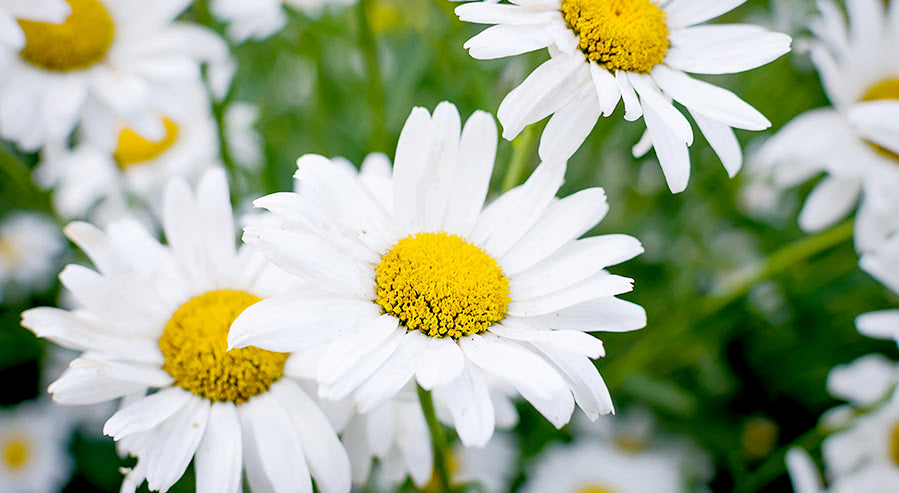
But chamomile tea has many uses beyond being a comforting, hot drink; it's also known for its healing traits. There is a lot of research to prove this, linking chamomile tea to less anxiety and better sleep. I'll talk about this more in a bit.
So, you might be thinking - what makes chamomile a top-notch calming tea blend? Here's the scoop: components like apigenin are found inside the flower petals. These components connect to specific receptors in your brain, helping to cut down anxiety and improve sleep quality. Thanks to this particular component, chamomile is seen as a natural remedy against anxiety and a suitable choice for a relaxing tea at the end of the day or during stressful times.
Chamomile's benefits aren't just talk - they are backed by solid science. In one particular study, people with chronic insomnia reported better sleep after having chamomile tea every day. This means you could have a quiet night's sleep by just enjoying a hot cup of chamomile tea. That's quite a tempting thought, don't you agree?
The Connection Between Chamomile and Anxiety
The secret to why chamomile and anxiety are closely linked is actually pretty simple once you understand the power of the chamomile flower. This flower, which grows in places like Western Europe, India, and Asia, has a unique way of interacting with our nervous system. Think about the sense of calm you enjoy after a deep breath; that's what a cup of chamomile tea is like for your nerves: a deep, soothing breath.
Now, anxiety is mostly about your body's responses, and in particular those of your nervous system. Picture it as a tightly wound spring, always tensed, ready to react. The soothing effect of chamomile is a bit like letting that spring gently unwind, slowly restoring a sense of calm.
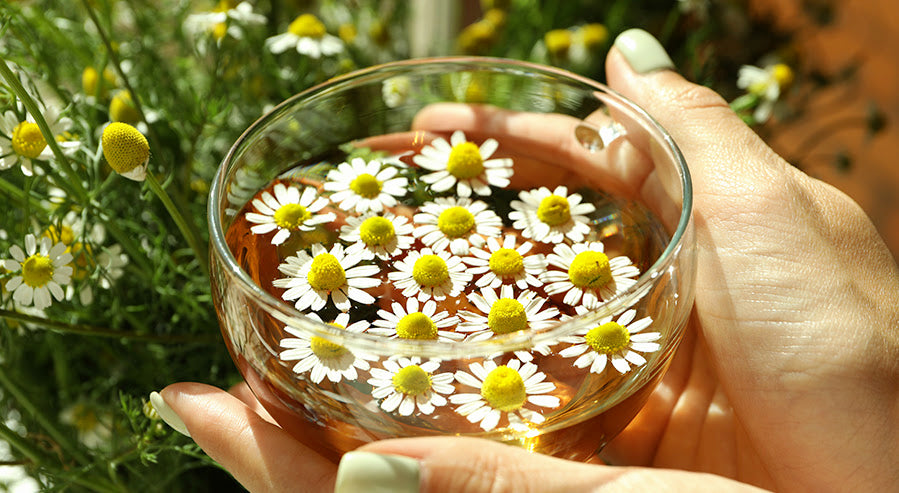
Next, the special ingredient in every cup of chamomile tea - apigenin. This is a compound that soothes nerve activity, acting as a sort of calming agent. It's like a skillful music conductor who brings harmony to a chaotic orchestra.
Now, let's get to know luteolin. This fella's job is to boost the calming effect of apigenin by reducing inflammation from chronic stress— the kind that makes anxiety symptoms even worse over time.
Together, these two compounds foster a sense of calming gentleness, quite naturally and subtly. They don't harshly suppress the nervous system. Instead, they gently persuade it to relax. Keep in mind that tightly wound spring we mentioned. The work of chamomile is kind of like gradually releasing tension from that spring. This gentle relaxation is what sets chamomile apart from powerful anxiety medications.
Chamomile doesn't storm in and suppress anxiety aggressively. Instead, it addresses the root problem—an overactive nervous system. Just as quiet people can often have a surprising impact without much noise, your cup of chamomile tea is much the same—quietly filled with the powerful calming duo of apigenin and luteolin, which deliver a biological sigh of relief to your nervous system.
How Effective Is Chamomile Tea for Anxiety Relief?
Chamomile tea is known for its soothing qualities, and it's becoming a big hit in our fast, stressful world as a natural way to fight off anxiety. Want to know if chamomile tea truly eases anxiety, or is this just an old wives' tale? Keep in mind, there's solid evidence backing up the soothing power of this simple herbal drink - it's not just a story inherited from our grandparents, but it's a part of traditional medicine confirmed by science.
The Journal of Clinical Psychopharmacology has some interesting research indicating that chamomile extract can decrease symptoms of Generalized Anxiety Disorder (GAD). Participants in the study, a group of 61 people with mild to moderate GAD, had a significant drop in anxiety after eight weeks of taking chamomile extract. I'm talking about a common drink that has a similar effect as special anxiety medication.
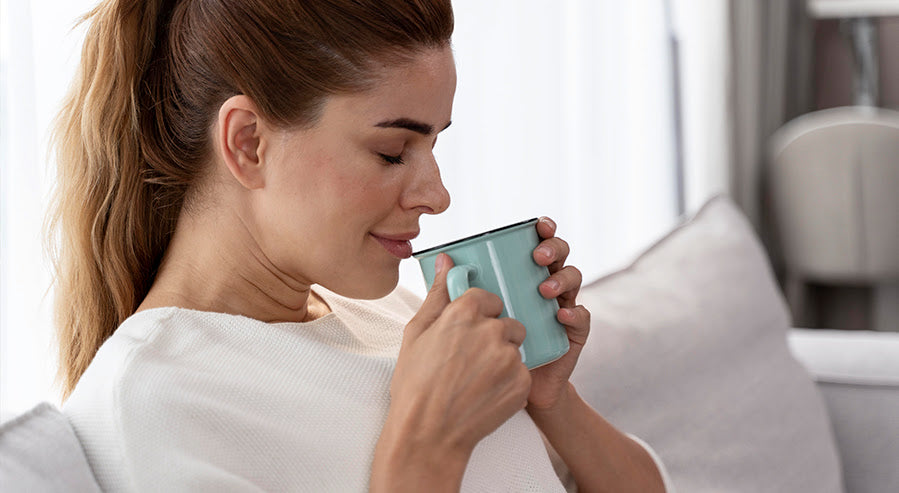
Many people think of chamomile tea as just a chill-out drink, particularly before bed. A 2016 study digs into this more, investigating other research with the same findings. It revealed the potential of chamomile tea to lower anxiety levels. Who would have thought that our teacups could hold such a powerful secret weapon against anxiety?
The belief is that it's the flavonoid compounds in chamomile tea that help fight anxiety. It's really surprising that a simple tea has such strong antioxidants known for helping with stress. A study with 179 participants recognized the long-term benefits of chamomile for dealing with anxiety. The research suggests that regular chamomile tea drinking doesn't just give you instant calm but might also stop anxiety symptoms from coming back over time. That's a pretty big deal for a tea that's usually nothing more than a bedtime drink.
Brewing the Perfect Cup of Chamomile Tea
The first major step is to choose whole chamomile flowers. Some people might find tea bags or ground chamomile more convenient, but what about whole flowers? It's true that whole chamomile flowers are famous for their oil richness, and it's important. Why, you ask? Because the benefit-packed chamomile tea is all about these oils. Options like ground chamomile or tea bags might not pack these oils. If you're aiming for a really rich mix of all the stress-busting qualities of this awesome herb, then whole flowers are the way to go.
Let's then head to the brewing part, which is an art in and of itself. The water temperature is a big deal - it has to be just right, neither too hot nor too cold. Typically, you're aiming for temperatures ranging from 200°F to 212°F. It's all about precision here. Crossing this limit could destroy the essential oils we're keen on preserving, slashing the soothing benefits of our chamomile tea.
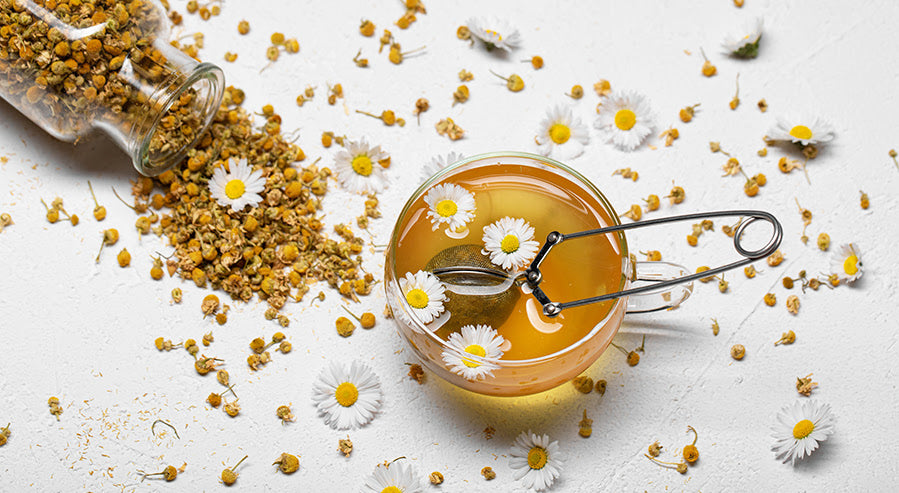
Time to discuss steeping - the length of time you let your chamomile flowers soak in the hot water. Perfecting a cup of tea is all about timing - it's a delicate balance. The flowers need between 5 and 10 minutes to unleash their power. Patience is key here, especially so when making chamomile tea. The longer you steep, the stronger the tea, but be cautious. Oversteeping might end up giving you a bitter tea.
Deciding on the strength of the tea? It comes down to what you prefer. Some may like a mild-tasting tea, and others might like their tea a bit more on the strong side. The number of chamomile flowers you use defines the strength - more flowers mean a stronger brew. Don't hesitate to play around with the quantities until you find just the right strength for you. After all, making tea is all about creating the perfect experience for you.
Keep in mind that a great cup of chamomile tea has many uses beyond about taste. It's also about the process of preparing it and tailoring it to your preference.
Potential Side Effects and Precautions
Chamomile tea can help you relax, but you've got to be aware of possible side effects and precautions. The big concern here is allergies. Chamomile might set off an allergic reaction in people who are allergic to plants from the daisy family, like ragweed, chrysanthemums, or marigolds. These reactions aren't just a little annoying - I'm talking about a rash, problems with breathing, or even anaphylaxis, a really dangerous condition that calls for immediate medical attention.
Before you drink chamomile tea, make sure you don't have a known allergy to any of these plants. If you do, chamomile might do more harm than good. There's another issue to consider as well - chamomile can affect how your body handles certain medications. For example, if you're taking blood thinners like warfarin and drink chamomile tea, you might increase your risk of bleeding.

Healthcare professionals call this a "herb-drug interaction," and it shows the importance of talking about herbal remedies with your doctor. If you're pregnant or planning to be, you should definitely think twice. While chamomile can be a great natural remedy, it's not a good fit for everyone. Some studies suggest chamomile may stimulate contractions of the womb, so to be on the safe side, it's best to avoid chamomile if you're expecting or trying to become pregnant.
Then there's the calming effect of chamomile - great for sleep, but too much of anything can have drawbacks. Too much chamomile tea might make you super sleepy or even cause vomiting. It's absolutely critical to keep your dosage under check, especially before surgery, because the calming effect of chamomile could mess with the anesthesia.
These warnings aren't meant to scare you but to ensure that, well, you're well-informed. Like with most things, moderation is the secret recipe to safe chamomile consumption.
Alternatives to Chamomile Tea
Are you aware of chamomile tea's fame for easing anxiety? It shares the spotlight with other soothing options like green tea. It is just a regular-tasting tea - but it's packed with the amino acid L-theanine. This little helper boosts brain function and cools down anxiety levels, creating a chilled-out atmosphere.
About another soothing ingredient - valerian root, or as it's often quite aptly called, "nature's tranquilizer." You'll mostly find it as a supplement. For centuries, people dealing with sleepless nights and worry-filled minds have turned to this veteran herb for some lasting relief. The Greeks and Romans knew the deal way back when!
And don't forget about lemons – they're not just for your iced tea. Lemon balm tea, a cousin of lemons, takes center stage with its stress-busting properties. This herb can drop your cortisol levels – that's the hormone that cranks up your stress.
Let's chat about another option - passionflower tea. It might be known for its vibrant flowers, but it's way more than just eye candy. Studies show that herbal medicine is a top competitor for calming tension and easing away worries.
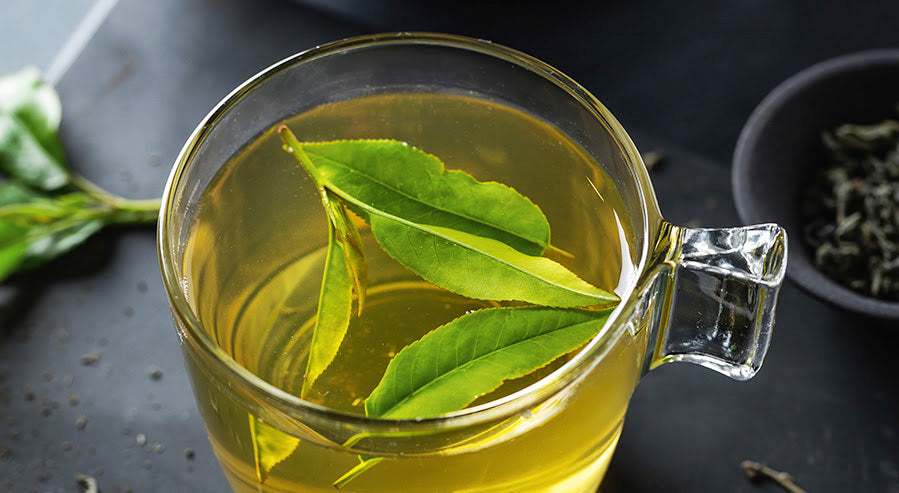
Each of these options brings something unique to your teacup, and they don't undercut chamomile's well-earned rep for calming nerves. Green tea's got that brain-boosting L-theanine, valerian root offers sedative support, lemon balm serves up familiar scents, and passionflower sure knows how to calm a storm. Even though chamomile tea is still the reigning champ with a track record for soothing frazzled nerves, the ultimate choice is yours – the tried-and-true comfort of chamomile or something new like lemon balm or passionflower. The real goal here is to find your perfect tranquility blend because you absolutely deserve peace. And going natural with teas is a path worth looking at for that elusive calm.
As you seek that sense of peace, consider introducing lavender as a real game-changer. Famous for its sleep-inducing scent in aromatherapy, it also makes a really serene tea. Whether you're smelling it or sipping it, lavender has proven its worth in fostering a peaceful state of mind, cooling down anxiety, and encouraging decent sleep.
Finding The Right Blend
Let's dig into how chamomile tea can serve as a natural defense against anxiety. This calming drink is not just a good ol' evening treat; it steps up to help us be mentally healthy. Interesting, right? This tea -- soaked in tradition and backed by scientific proof -- is a simple, real-deal solution for a healthier mind.
Have you ever thought that your everyday tea could really influence your mental health?
Strong compounds like apigenin and luteolin, found in chamomile, are the main players in easing anxiety. This age-old plant packs a punch, using modern science to show its value. Isn't it interesting to think that brewing these simple, innocent-looking flowers into a soothing drink could help lessen anxiety?
We all know too well the downsides of anxiety. But here's this chance to control them using natural remedies like chamomile tea. We should look at these treatments not just as fallback options but, more importantly, as useful partners.
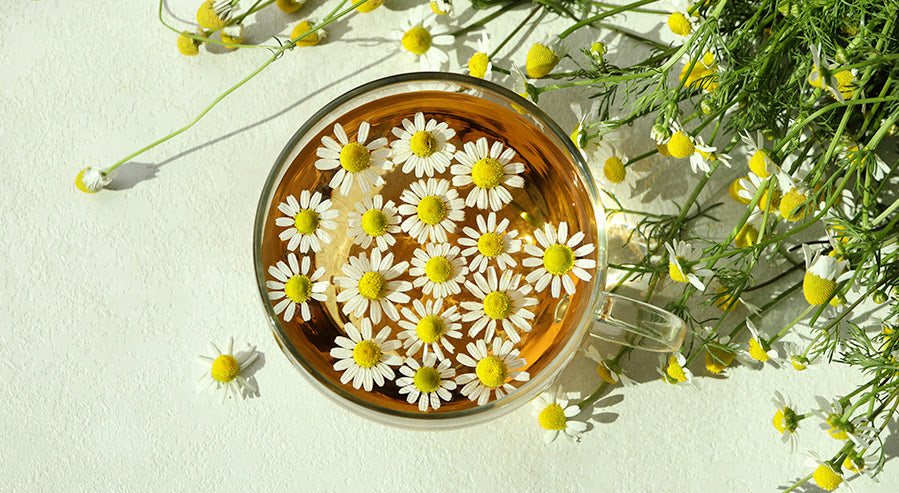
Chamomile tea combines traditional use and scientific proof to cut down anxiety levels. It offers a drug-free and non-intrusive way to deal with anxiety—a big win for our society today.
But, while chamomile tea can soothe anxiety, it shouldn't take the place of any prescribed medicines or therapies. It's here to boost, not to replace.
Now, let's take a step back to see the bigger picture. It's not just about chamomile, but it's about how we interact with nature, our bodies, and our mental health. Even more really, it's about growing a culture that gives as much importance to mental health as we do to physical health.
Can you imagine how strong we'd become if we included nature's healing power in our day-to-day habits? Chamomile tea represents more than a drink to calm an anxious mind—it's a guide to a more naturally healthy and joyful state of mind.